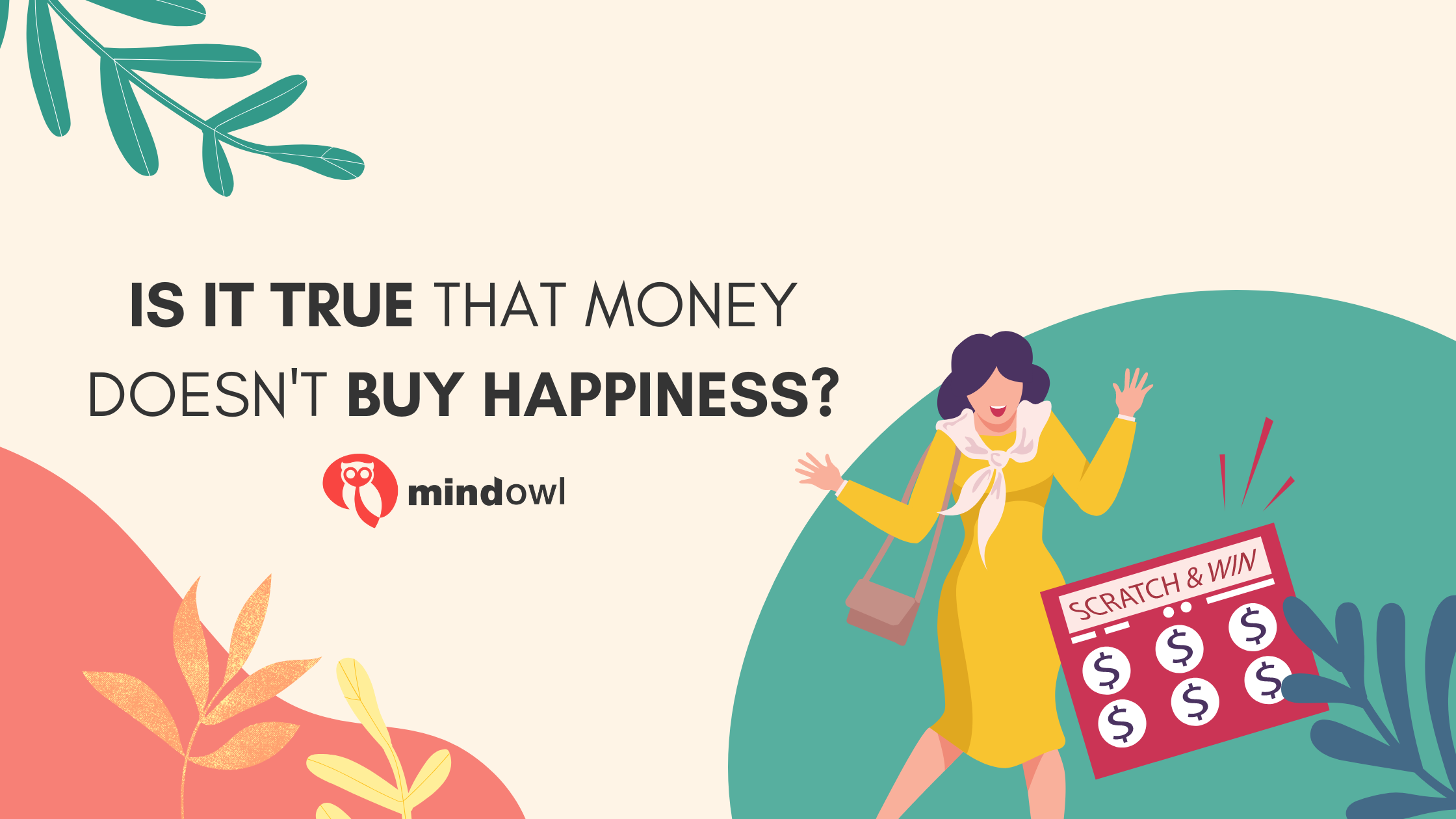Money can make your life simpler and easier, and admittedly it can solve a whole host of problems. The idea that money can’t buy happiness may be scoffed at by poorer people who are finding it hard to pay the bills, and this is completely understandable. If you’re struggling, a cash injection can make a huge difference to your level of happiness and well-being. However, what this phrase really means is that although money can help alleviate stress, it can’t provide you with the things that are truly meaningful in life. Social pressures have made us equate all sorts of complex problems regarding friends, family, careers, free time, busy schedules and hobbies with one solution: more money. Unpacking the ideology that more cash means more freedom and time is key to finding true happiness in life. But how do we do that? And why doesn’t money provide us with the happiness we think it will?
The problems with money
Developmental psychologist Robert Kenny’s survey of ultra-rich people found that while money eased many aspects of life, it made other aspects more difficult. Wealthier people worry about raising spoiled children who lack motivation for success, or are isolated from society. Wealthy people are often unsure whether people are friends with them for their money or their personality. Extreme wealth can be an obstacle to a meaningful life, because it means you don’t have to work hard to realise what matters to you.
One thing many people don’t consider is that the more stuff you own, the more work it takes to look after it all. Larger homes take longer to clean, while more valuable possessions cause us to worry constantly about their safety. Meanwhile, you’ll have less free time, because you’re spending it maintaining the things you’ve accumulated.
Ultimately, buying things only produces temporary satisfaction. On the other hand, putting effort into our experiences rather than our possessions creates more long-lasting, fulfilling happiness. Our brains respond positively to experiences like getting out of the house and doing something new, engaging with others, or travelling. Focus on creating memories and cultivating gratitude, rather than acquiring things. Think about it: you will never look back on your life experiences, memories, and achievements, and say to yourself, “I wish I had bought more stuff”. Yes, sometimes it costs money to be able to enjoy experiences, such as holidays or trips out. However, in these situations it is not the money that is providing joy or happiness, it is the experience itself.

Can money ever bring happiness?
Certain studies have found that money does improve well-being, by removing some of the stresses and difficulties of daily life. However, this sense of happiness is often very much surface level; ultimately, there are some things that money simply can’t buy. In addition, research shows that while money can have a positive impact on your happiness levels, the effects top out once you have a certain amount. Having enough money to eat well, pay your bills, take holidays and comfortably afford the necessities of life makes you happier, but a famous Princeton University study found that there is a limit to this happiness.
Yes, wealth can help tackle external pressures and bring temporal, spatial, and sometimes psychological freedom, but as explored above, it also causes problems. And while it may seem like money can have a positive effect on your internal feelings, this will always be temporary. A shopping spree could give you intense feelings of euphoria and excitement, but these emotions will not last. If you were empty before this money-orientated experience, that feeling will return.
The Happiness Trap
There are a number of traps we can fall into in relation to individual and societal beliefs about happiness. Happiness is a complex state that can’t be easily measured, so it’s not surprising that sometimes we struggle to know what will make us happy. In The Happiness Trap, author and psychotherapist Dr. Russ Harris strives to debunk certain popular myths about happiness. Let’s take a look at some of these.
The ‘if-then’ trap
Have you ever thought to yourself, “if I get this, I will feel that”, or “if I achieve x,y,z I will be happy or accomplished”? This ‘if-then’ mindset is one of the biggest happiness traps you can fall into. Unfortunately, life isn’t this simple. By basing your happiness on external factors, you are setting yourself up for failure. Relying on things we can’t control reduces our sense of security, because circumstances could just as easily change and take that superficial happiness away. This process of delaying satisfaction until we achieve something also stops us from experiencing pleasure and happiness in the present moment. Sam Harris, author of Waking Up, sums this up perfectly: “as you begin to succeed, the illusion that you are going to arrive at some place of real emotional serenity… it tends to be a mirage”.
‘Happiness is the natural state’
One of the biggest misconceptions regarding happiness is that it’s the natural state for human beings; if you give them food, water, and safety, they will naturally be happy. Sadly, this isn’t accurate. The normal state for a human being is an ever-changing flow of emotions, some positive, some negative. The sooner we accept this, the better.
‘Happiness means feeling good’
If this is your idea of happiness, then what is lasting happiness? And how could it ever be possible? Unfortunately, no good feeling lasts forever. The things that make life genuinely rich and meaningful (such as intimate relationships) don’t necessarily always make us feel good; however, they do help produce lasting happiness. On the other hand, the temporary happiness we gain from material things will always pass. So why do we continue to think that money will buy happiness?
Why do we believe that money will bring us more happiness?
The belief that money can buy happiness is promoted strongly within popular culture. If not money, then relationships, success and achievement are held up as utterly key to happiness. This is simply not true. One of the reasons for this is a powerful force that psychologists call hedonic adaptation, or the hedonic treadmill.
The Hedonic Treadmill
Human beings are great at rapidly getting accustomed to physiological and sensory changes. We experience this when we get used to certain temperatures or smells within the home. However, this also happens with more significant shifts in our life; relocations, job changes, or marriages will make us happy for a time, but soon we adapt to them and their temporary happiness-boost disappears. Bursts of joy will level out, and even the biggest achievers (like lottery winners) have been found to be no happier than the rest of us, because they adapt to their changed circumstances.
What causes the hedonic treadmill?
While people are briefly satisfied by nicer cars, bigger houses and better clothes, these results of a disposable income will eventually be normalised, and people will begin to want more. A big part of this is social comparison; if our neighbours have something we deem superior, we start to want it ourselves. Following these patterns and constantly rising our standards means that our overall happiness tends to stay the same.
Our tendency to always want more is partly due to evolution. Prehistoric dangers and threats meant that a perpetual state of psychological suffering, worry and anxiety was necessary for survival, and so the human mind evolved to work in this way. Today, this caveman mentality constantly tells us we need more food, more water, more clothes and a better house, because historically this mindset helped people prosper. Sadly, in modern society this manifests as greed, dissatisfaction, and want.
So, what brings us happiness?
The hedonic treadmill shows us that happiness is not determined by life circumstances. According to the work of psychology professor Dr. Sonja Lyubomirsky, happiness is determined by 50% genetics, 40% intentional activity and just 10% circumstances. The things we think will dramatically alter our lives rarely do. Instead, we need to focus on nurturing the behaviours that very happy people habitually engage in, such as making time for friends and family, cultivating and expressing gratitude, building resilience for when hard times strike, and spending time in flow states, in which you’re fully immersed in an activity.
What does real happiness actually mean? Well, happiness means different things for different people, so don’t get bogged down by dogma that doesn’t apply to you. Happiness could mean pursuing your thirst for knowledge, or mapping out your life plans in detail, or reading your child a bedtime story, or simply taking time to cook yourself nice food. We all have the potential to increase our quality of life, if we focus on our core values and engage in the things that matter. Hedonic adaptation means that material items can’t provide long-term happiness; only we can do this for ourselves.
How meditation can help you find happiness
Meditation is one of the most effective ways of escaping the rat race and rejecting the idea that money is the source of happiness. By rooting yourself in the present moment and feeling a variety of sensations deeply, you can truly appreciate the freedoms and joys available to you, which can provide you with real happiness.
One of the biggest problems in modern life is that we are always looking forward to our next high, and thinking too much about the future. This means we don’t allow ourselves to be content in the present moment. Meditation seeks to counter this process by rooting you in the here and now and putting a spotlight on sensations, breathwork, and our relationships with our thoughts. Doing this doesn’t mean ignoring the various issues we might be facing, it just means trying to detach ourselves from them and gain perspective. This can help us feel more fulfilled and content with our current life conditions.
The reason that meditation can provide a solution here is because it is founded on the idea of cultivating an observing self. In meditation, when we experience negative thoughts and feelings, we attempt to accept them, separate ourselves from them, and observe. This is a more healthy response than trying to shut down negativity, which actually tends to only amplify it. When we view money as a solution to our problems, we tap it into this tendency to suppress issues rather than actually dealing with them. By changing our attitudes towards money and seeking to cultivate lasting internal well-being through experiences and relationships, we place ourselves on the path towards real happiness.Yes, financial security can help improve our lives and give us comfort and safety. However, pursuit of money at all costs makes us miserable and puts in jeopardy the things that actually matter in life. As we’ve discussed, concepts such as the hedonic treadmill underline how chasing money can never bring lasting satisfaction. If we instead focus on cultivating happiness through experiences, relationships, and mindfulness, we give ourselves a much better chance of being truly content. Want to find out more? Check out our Real Happiness meditation course.
MindOwl Founder – My own struggles in life have led me to this path of understanding the human condition. I graduated with a bachelor’s degree in philosophy before completing a master’s degree in psychology at Regent’s University London. I then completed a postgraduate diploma in philosophical counselling before being trained in ACT (Acceptance and commitment therapy).
I’ve spent the last eight years studying the encounter of meditative practices with modern psychology.




One thought on “Is it true that money doesn’t buy happiness?”